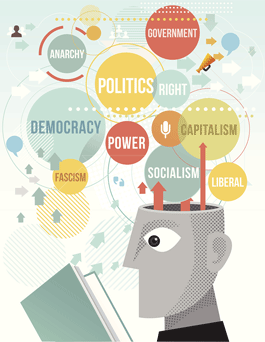2.3 The contestability of concepts
Having just been introduced to multiple and at times contradictory definitions of politics, you will already have an idea that politics is something of a contested concept. It is impossible to provide a single definition of politics, as there is no single definition on which everyone agrees – it is, indeed, a contested concept. But what exactly does this mean? To understand what qualifies as a contested concept, we must first understand the term ‘concept’. Andrew Heywood says the following about concepts:
A concept is a general idea about something, usually expressed in a single word or a short phrase. A concept is more than a proper noun or the name of a thing. There is, for example, a difference between talking about a cat (a particular and unique cat) and having a concept of a cat (the idea of a cat). The concept of a cat is not a ‘thing’ but an ‘idea’, an idea composed of the various attributes that give a cat its distinctive character: ‘a furry mammal’, ‘small’, ‘domesticated’, ‘catches rats and mice’, and so on... In the same way, the concept of ‘presidency’ refers not to any specific president, but rather to a set of ideas about the organization of executive power.
If we apply this definition of concepts to what we have studied thus far, we could say that we have been studying the concept of politics. We have been trying to understand what politics is, as a ‘general idea’: what ‘attributes’ or characteristics it has; what distinguishes it from other concepts (such as violence, for instance); in other words, where politics begins and ends. But how is delineating the boundaries of a concept (be it the concept of a cat, or the concept of politics) useful? Heywood argues that concepts are valuable, as they are the tools through which we engage with the world:
Merely perceiving the external world does not in itself give us knowledge about it. In order to make sense of the world we must... impose meaning upon it, and this we do through the construction of concepts. Quite simply, to treat a cat as a cat, we must first have a concept of what it is. Concepts also help us to classify objects by recognising that they have similar forms or similar properties... It is no exaggeration to say that our knowledge of the political world is built up through developing and refining concepts which help us make sense of that world. Concepts, in that sense, are the building blocks of human knowledge.

Concepts are abstract ideas (or mental images) that allow us to make sense of a messy world by enabling us to classify, categorise and order the multitude of things we encounter. Having a concept of a cat allows us to recognise that many of the ‘small’, ‘domesticated’, ‘furry mammals’ we encounter belong to a single class of entities we call ‘cat’. Similarly, having a concept of politics allows us to recognise a host of activities we encounter on a daily basis as having similar forms or properties, and thus as belonging to a distinct class of entities called ‘political’.
Concepts allow us to make sense of the world by enabling us to impose form and meaning on what might otherwise appear as formless and meaningless chaos. But what if little agreement exists about the concept itself? What if the concept itself is contested? Wouldn’t the existence of two different concepts of ‘cat’ – whereby according to one concept cats were ‘small’, ‘domesticated’ and ‘furry’ but according to another they were actually ‘small’, ‘winged’ and ‘feathered’ – reduce the utility of the concept, making it more difficult for us to make sense of the animals we were encountering? While you might agree that having two competing concepts of ‘cat’ might reduce the utility of the concept, you might also be thinking that the whole premise of this exercise is rather silly. Cats are cats, and the meaning of cat is universally shared; what qualifies as a cat is not really contested, and no one would actually imagine a cat as ‘winged’ and ‘feathered’.
While that may indeed hold for the concept of ‘cat’, it does not, as you have seen in this section, hold for the concept of politics. Politics is much more of a contested concept than the concept of ‘cat’ and little agreement exists on what ‘counts’ as politics. Some have argued that this is the case for most, if not all, concepts in the social sciences – they are often more fundamentally contested than those in the ‘harder’ sciences such as zoology or physics. Concepts in the social sciences can be ‘slippery customers’ (Heywood, 2013, p. 18). In this section, we have looked at only one concept – politics – and you can already see what a ‘slippery customer’ it can be. There are many more concepts, the meaning of which are, to a greater or lesser extent, contested. Contests over these concepts are not just ‘academic’; they have considerable real-life consequences. As Heywood (2013, p. 20) points out, many have argued, fought and even gone to war ‘claiming to be “defending freedom”, “upholding democracy”, or “having justice on their side”’.
Concepts such as democracy, freedom and justice, and the concept of politics itself, are seen by many to be ‘essentially contested concepts’ – ‘controversy about them runs so deep that no neutral or settled definition can ever be developed’ (Heywood, 2013, p. 20). Walter Bryce Gallie, who originally coined the phrase, offered the following definition of ‘essentially contested concepts’: ‘concepts the proper use of which inevitably involves endless disputes about their proper uses on the part of their users’ (Gallie, 1956, p. 169). In his book, The Terms of Political Discourse, William E. Connolly applied the phrase to politics, arguing that some key political concepts – including the concept of politics itself – are essentially contested. Using democracy as an example, Connolly noted that the commonly accepted criteria of democracy are weighed differently by different parties and:
certain criteria viewed as central by one party are rejected as inappropriate or marginal by others... Thus for some the central criterion of a democracy is the power of citizens to choose their government through competitive elections; for others this factor is less important than the equality of opportunity for all citizens in attaining positions of political leadership; for still others both of these criteria pale in significance if the continuous participation of citizens at various levels of political life is not attained.
The same, Connolly argues, goes for politics, ‘a concept particularly susceptible to contests about its proper range of application’ (p. 20). What is more, ‘not only is politics an internally complex concept with a broad and variable set of criteria but each criterion itself is relatively complex and open’ (p. 14). Think back to some of the definitions of politics we previously discussed – for instance, politics as a ‘social’ activity or politics as distinct from ‘violence’. It is not only the concept of politics that is contested here. Equally contested are the concepts of ‘social’ and ‘violence’. Remember some of the questions we asked while discussing these definitions of politics, like what qualifies as ‘social’, or what qualifies as ‘violence’? The contested nature of politics is also related to the contested nature of other concepts.
Where does this bring us? Have we again gone too far? If so many crucial political concepts are contested, then what is the use of trying to understand them? For Connolly (1993, p. 6), ‘conceptual contests are central to politics’. Indeed, he adds, ‘To examine and accept, or to examine and revise the prevailing terms of political discourse is not a prelude to politics but a dimension of politics itself’ (p. 3). And so, to the multiple definitions of politics we have already encountered, we can add one more: politics as critical engagement with the prevailing terms of political discourse. As Heywood (2013, p. 20) puts it, ‘politics is, in part, a struggle over the legitimate meaning of terms and concepts’.
